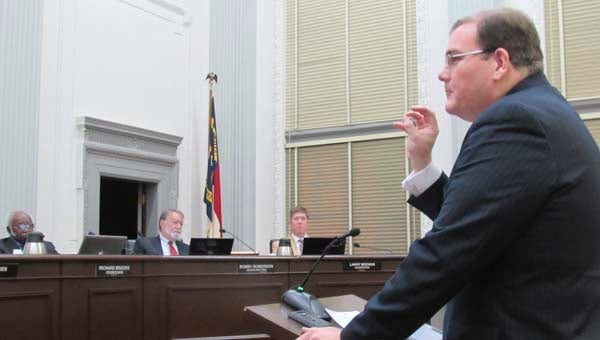Two-year terms remain: Council rejects four-year terms
Published 5:50 pm Tuesday, February 24, 2015

MIKE VOSS | DAILY NEWS
SPEAKING UP: Derek Davis tells the City Council his views on a proposal to change the terms of office for the mayor and council members from two years to four years.
Washington’s mayor and City Council members will continue to serve two-year terms of office.
The council voted 4-1 Monday night to retain the process in which the mayor and council members are elected every other year instead of pursing a change in the city charter that would allow the mayor and council members to serve four-year staggered terms. Council members Richard Brooks, Doug Mercer, William Pitt and Bobby Roberson voted for the motion (made by Mercer) to keep the existing process in place. Councilman Larry Beeman voted against it.
If the council had voted to pursue changing the city charter to allow four-year terms, council members made it clear they would have allowed voters to weigh in on the matter by way of a referendum, saying such a proposed change should have voters’ support.
Washington resident Derek Davis, during a hearing on the issue, said has no strong objections to four-year terms if it helps in “representation of the citizens of Washington.” Davis said he supports allowing voters, by way of a referendum, determine if the mayor and council members should serve four-year, staggered terms.
Davis was the only member of the public to speak during the hearing. Mercer reminded the council members they had received word by email from Washington residents Jerry and Martha Seighman, who were out of town Monday, that they oppose four-year terms.
“Although this has become something that is going on across the state, that does not necessarily mean we have to adopt it,” Pitt said. “I do understand the concept of staying with four-year terms with regard to major projects, things that are ongoing that need the continuity of the council, but again, with regard to Mr. Davis, I do believe the public should make the final decision.”
Mayor Mac Hodges and Brooks, before the vote was made, said further study of the issue is needed to determine what effects changing the term lengths could have.
“Anything we do, we need to study it, check it out before we do it,” Brooks said. “After you do something, it’s too late to study it.”
After a brief discussion concerning how staggered, four-year terms could be achieved, Mercer then made his motion to keep the two-year terms.






